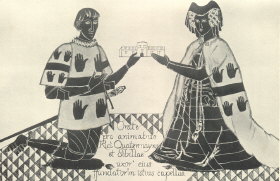
Richard and Sybil Quartermain, taken from a window formerly in Rycote Chapel
Richard Quartermain was born in 1392 and was a third son, not expected to inherit the family estate. Consequently he was trained in the law and business.
Due to the death of his brothers, however, Richard inherited the family estate, including the ancestral home at North Weston. In 1415, through his marriage to Sybil Englefield, he also inherited the manor of Rycote.
His early career was spent in London, and in 1421 his business affairs led him to appeal against a decision taken by the court of the Mayor of London, Richard Whittington, which he termed a 'manifest error in the record and judgement'. This was indeed a case of 'think again Dick Whittington!'.
In 1422, Richard Quartermain was appointed by King Henry V as the Customs officer for the Port of London, which required him to supervise in person the trade of the port during the twenty four years he held the post.
He nonetheless served on many Royal Commissions relating to affairs of state and of law in Oxfordshire during that time.
King Henry VI came to the throne in 1422, but he was only six months old. England's fortunes declined at home and abroad during the young King's reign, and Richard Quartermain became engaged in efforts both to keep the peace at home and to raise subsidies to fund the wars with France.
Richard Quartermain served as Member of Parliament for Oxfordshire in 1432 and 1433, and in 1434 he was appointed to a commissioner to receive the oaths of the notable people of Oxfordshire that they would not support law-breakers. Things were not going well for England in France, and support for the child King at home was not strong.
In 1436 Richard became High Sheriff of Oxfordshire and also a commissioner charged with inducing the people of Oxfordshire to lend a large sum of money to the young King to fund the war with France. Richard Duke of York was now to lead the campaign, and this was the start of a close bond between Richard Quartermain and the House of York.
Richard's role in the Customs of London came to and end in 1445, and he received a good reward for his long service. He was now 53 years old and free to concentrate on matters closer to home.
In 1447 Richard and Sybil Quartermain founded the Guild of St Christopher at Thame, and endowed the town's first alms houses. Within the terms of the license granted to the Guild of St Christopher, a hermitage was to be set up at Tetsworth, along with a Chapel of Devotion dedicated to St John the Baptist. The hermit was to be employed repairing the road between Stokenchurch and Wheatley, which had long been in need of repair.
A new Chapel was consecrated at Rycote in 1449, along with a Chantry dedicated to St Michael. Rycote Chapel remains a magnificent monument to the works of Richard Quartermain, but his residence at Rycote was later demolished to make way for the Tudor mansion built on the site.
In 1454 Richard Quartermain became High Sheriff of Oxfordshire once more. The Wars of the Roses began soon afterwards, and with the eventual victory of the House of York, in the person of King Edward IV, Richard was called into royal service again.
A commission was given authority over the river Thame from Nether Winchenden to Waterperry and on to Dorchester in 1468, possibly with a view to flood protection. Richard Quartermain served on this commission, along with Sir Richard Harcourt, William Marmion, Humfrey Foster, William Fowler and Richard Fowler.
Richard Fowler was the great nephew of Sybil Quartermain and became Chancellor of the Duchy of Lancaster in 1473. Whilst the Quartermains lived at Rycote, Richard Fowler lived at the Quartermain family's ancestral home at North Weston.
In 1471 Richard Quartermain and John Giffard were appointed to a Commission of Array in Oxfordshire, at a time when several Lancastrian supporters within the county were being arrested. They arrested Peter Marmion and Richard D'Oilly.
At the age of 79, Richard Quartermain again became Member of Parliament for Oxfordshire in 1472, at a time when King Edward IV was bringing about the financial reform of the English monarchy, enabling it to live off its own revenue and not have to depend on subsidies and loans such as those Richard Quartermain had striven to raise in his younger days.
As part of this process, Richard Quartermain, as the 'King's Councillor' and Richard Fowler, as the Chancellor of the Duchy of Lancaster, were charged with inquiring into the value of certain royal possessions, including Windsor Castle, in 1476.
After a lifetime of service to Henry V, Henry VI and Edward IV, and to the people of Thame and district, through such things as the Guild of St Christopher, the alms houses, the maintenance of the highways and the management of the river, this remarkable man died in 1477. He was buried in Thame's St Mary's Church.
Richard and Sybil Quartermain had no surviving children and the estate at Rycote passed to Richard Fowler.
The Quartermain Family and the Domesday Book
Richard Quartermain's Manor House
The Guild of St Christopher
Thame's Almshouses